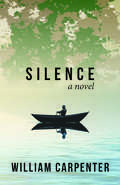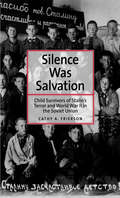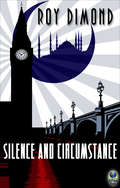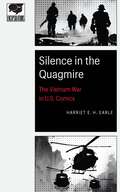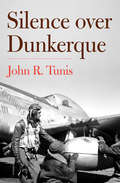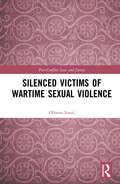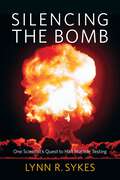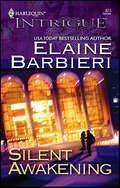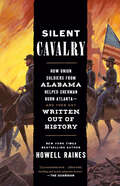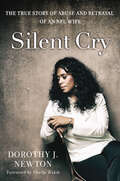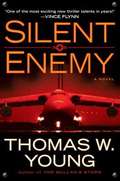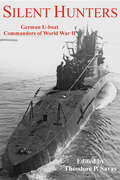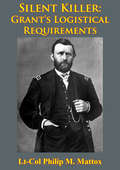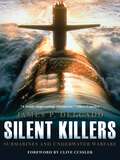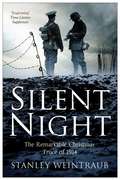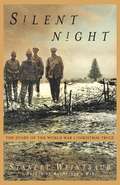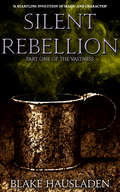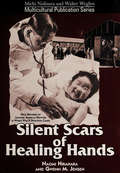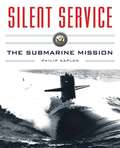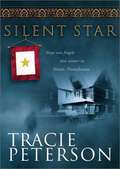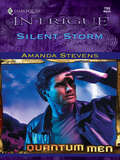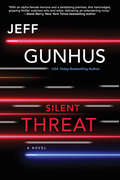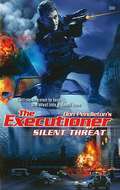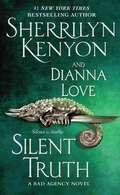- Table View
- List View
Silence
by William CarpenterNick Colonna is a young veteran returning from Iraq to the coast of Maine after an IED explosion kills his entire crew and leaves him deaf. Struggling with trauma, Nick finds solace in memories of nearby Amber Island—a private sanctuary owned by a Boston family set on development, much to the despair of its youngest daughter, Julia. As Nick battles his inner demons, Julia fights her family, and Amber Island faces demolition, Carpenter raises questions about what survives carnage and loss and where—in a divided and chaotic world—is there room for peace and silence.
Silence Was Salvation
by Cathy A. FriersonRoughly ten million children were victims of political repression in the Soviet Union during the Stalinist era, the sons and daughters of peasants, workers, scientists, physicians, and political leaders considered by the regime to be dangerous to the political order. Ten grown victims, who as children suffered banishment, starvation, disease, anti-Semitism, and trauma resulting from their parents’ condemnation and arrest, now freely share their stories The result is a powerful and moving oral history that will profoundly deepen the reader’s understanding of life in the U. S. S. R. under the despotic reign of Joseph Stalin.
Silence and Circumstance
by Roy DimondHistorical fact and tantalizing fiction merge in this unique interwar thriller about Agatha Christie&’s mysterious disappearance in 1926. When Agatha Christie disappeared for eleven days in December, 1926, all of England was abuzz with speculation. Did the great writer really just &“black out,&” only to somehow reappear days later at a spa hotel? Could she be a pawn trapped in an international mystery? Or was she the puppet-master? The adventure unfolds through the perspective of Christie&’s trusted governess, Charlotte &“Carlo&” Fisher. After receiving a mysterious letter, Charlotte embarks on a harrowing quest, aided by many of the famous and elite of the twentieth century. While Sir Arthur Conan Doyle and his protégé, Ian Fleming, speed towards Istanbul on the Orient Express in search of Agatha&’s diary, Charlotte discovers clues that dispatch her to Berlin where she stumbles into a world gone mad. With a dizzying cast of characters that includes Dorothy Parker, Pablo Picasso, Lillian Hellman, J.R.R. Tolkien, and many others, this historical adventure delves into the shadows of mysterious societies, where it appears something dark is rising . . .
Silence in the Quagmire: The Vietnam War in U.S. Comics (Encapsulations: Critical Comics Studies)
by Harriet E. EarleIn Silence in the Quagmire Harriet E. H. Earle uses silence to construct a narrative of the Vietnam War via U.S. comics. Unlike the vast majority of cultural artifacts and scholarly works about the war, which typically focus on white, working-class American servicemen and their experiences of combat, Earle&’s work centers less-visible players: the Vietnamese on both sides of the conflict, women and girls, and returning veterans. Earle interrogates the ways this conflict is represented in American comic books, with special focus on these missing groups. She discusses how—and more critically why—these groups are represented as they are, if they&’re represented at all, and the ways these representations have affected views of the war, during and since. Using Michel Foucault&’s understanding of silence as discourse, Earle considers how both silence and silencing are mobilized in the creation of the U.S.-centric war narrative. Innovative in its structure and theoretical scaffolding, Silence in the Quagmire deepens our understanding of how comic books have represented the violence and trauma of conflict.
Silence over Dunkerque
by John R. TunisA historical novel about one man&’s experience of the evacuation of Dunkirk: &“A lively tale around one of the turning points of World War II&” (The New York Times). Sergeant Edward Williams of the Second Battalion was among the first British troops to land in France, just across the English Channel from his family in Dover, after the declaration of war in September of 1939. Battles have been few and far between since then, in what the Germans have been calling der Sitzkrieg—the sitting war. In May 1940, under the leadership of their new prime minister, Winston Churchill, the British are hoping to stem the tide of Nazi invasion along their southern border. But now, flanked to the east and west by German troops and cut off from the Allies further south, Sergeant Williams and his battalion must retreat to Dunkerque in the north, and escape by sea is their only hope.
Silenced Victims of Wartime Sexual Violence (Post-Conflict Law and Justice)
by Olivera SimicThe condemnation of wartime sexual violence as a gross violation of human rights has received widespread support. While rape and other forms of sexual violence have attracted considerable local and international attention, this often excludes wartime sexual violence among women belonging to so-called ‘perpetrator’ war-torn nations. This book explores the silence surrounding women’s experiences of wartime sexual violence within academic, legal and public discourses. Olivera Simić argues that the international criminal law and feminist legal discourse on wartime sexual violence can construct a problematic victim hierarchy that excludes and misrecognises certain women’s experiences of sexual violence during and after armed conflict. The book focuses on the experiences of Bosnian Serb women, where the collapse of the former Yugoslavia led to brutal war and gross human rights violations throughout the 1990s. Two decades after the war, women in Bosnia and Herzegovina are still facing the legacies of the violence in the 1990s. Through this case Simić argues that while all women survivors of rape face problems of stigma, shame and lack of political visibility, their legal and symbolic status differ according to their ethno-national identity. Drawing on interviews with Bosnian Serb women survivors of rape in Bosnia and Herzegovina, feminist activists, local media, documentary and archival sources, the book examines ‘post-conflict justice’ as it is seen, lived and interpreted by women who belong to ‘perpetrator’ nations and will be of great interest and use to researchers, students and practitioners within post-conflict law and justice, international criminal law, security studies and gender studies.
Silencing the Bomb: One Scientist's Quest to Halt Nuclear Testing
by Lynn R. SykesIn December 2016, the Bulletin of Atomic Scientists moved their iconic “Doomsday Clock” thirty seconds forward to two and a half minutes to midnight, the latest it has been set since 1952, the year of the first United States hydrogen bomb test. But a group of scientists—geologists, engineers, and physicists—has been fighting to turn back the clock. Since the dawn of the Cold War, they have advocated a halt to nuclear testing, their work culminating in the Comprehensive Test Ban Treaty, which still awaits ratification from China, Iran, North Korea—and the United States. The backbone of the treaty is every nation’s ability to independently monitor the nuclear activity of the others. The noted seismologist Lynn R. Sykes, one of the central figures in the development of the science and technology used in monitoring, has dedicated his career to halting nuclear testing. In Silencing the Bomb, he tells the inside story behind scientists’ quest for disarmament.Called upon time and again to testify before Congress and to inform the public, Sykes and his colleagues were, for much of the Cold War, among the only people on earth able to say with certainty when and where a bomb was tested and how large it was. Methods of measuring earthquakes, researchers realized, could also detect underground nuclear explosions. When politicians on both sides of the Iron Curtain attempted to sidestep disarmament or test ban treaties, Sykes was able to deploy the nascent science of plate tectonics to reveal the truth. Seismologists’ discoveries helped bring about treaties limiting nuclear testing, but it was their activism that played a key role in the effort for peace. Full of intrigue, international politics, and hard science used for the global good, Silencing the Bomb is a timely and necessary chronicle of one scientist’s efforts to keep the clock from striking midnight.
Silent Awakening
by Elaine BarbieriHIS SHIELD AND GUN WERE HERS TO COMMANDStalked by a killer after discovering his nearly untraceable chemical weapon, scientist Natalie Patterson collided with one of New York’s finest-rugged homicide detective Brady Tomasini. The elegant scientist and the steel-hard cop should never have met. But now their fiery attraction was as undeniable as it was inconvenient.For the first time, Brady wasn’t in control. Surrendering himself to Natalie’s soft, smoky eyes wouldn’t help him catch the killer. Unless.... The closer they got, the more angry Natalie’s stalker became-and the more careless. Was giving in to unexpected passion the best way to flush out the killer...and would Brady’s and Natalie’s hearts survive the aftermath?
Silent Cavalry: How Union Soldiers from Alabama Helped Sherman Burn Atlanta--and Then Got Written Out of History
by Howell RainesA Pulitzer Prize–winning journalist reveals the little-known story of the Union soldiers from Alabama who played a decisive role in the Civil War, and how they were scrubbed from the history books.&“It is my sincere hope that this compelling and submerged history is integrated into our understanding of our nation, and allows us to embrace new heroes of the past.&”—Imani Perry, professor, Harvard University, and National Book Award–winning author of South to AmericaWe all know how the Civil War was won: Courageous Yankees triumphed over the South. But is there more to the story?As Pulitzer Prize–winning journalist Howell Raines shows, it was not only soldiers from northern states who helped General William Tecumseh Sherman burn Atlanta to the ground but also an unsung regiment of 2,066 Alabamian yeoman farmers—including at least one member of Raines&’s own family.Called the First Alabama Cavalry, U.S.A., this regiment of mountain Unionists, which included sixteen formerly enslaved Black men, was the point of the spear that Sherman drove through the heart of the Confederacy. The famed general hailed their skills and courage. So why don&’t we know anything about them?Silent Cavalry is part epic American history, part family saga, and part scholarly detective story. Drawing on the lore of his native Alabama and investigative skills honed by six decades in journalism, Raines brings to light a conspiracy that sought to undermine the accomplishments of these renegade southerners—a key component of the Lost Cause effort to restore glory to white southerners after the war, even at the cost of the truth.In this important new contribution to our understanding of the Civil War and its legacy, Raines tells the thrilling tale of the formation of the First Alabama while exposing the tangled web of how its wartime accomplishments were silenced, implicating everyone from a former Confederate general to a gaggle of Lost Cause historians in the Ivy League and a sanctimonious former keeper of the Alabama state archives. By reversing the erasure of the First Alabama, Silent Cavalry is a testament to the immense power of historians to destroy as well as to redeem.
Silent Cry: The True Story of Abuse and Betrayal of an NFL Wife
by Dorothy J. NewtonIn this moving memoir, a former NFL wife shares her story of domestic abuse, survival, hope, recovery, victory, and faith.Raised near New Orleans as one of six children, Dorothy Newton was surrounded by abuse and poverty as she grew up. But she became the first in her family to graduate from college and moved out of poverty. She then began to live out her dreams in Dallas of a better home and life when she married celebrity superstar football player Nate Newton. She had gone from poverty to the pinnacle of success. She was married to a handsome, successful, famous professional athlete, who was a three-time Super Bowl Champion and six time Pro-Bowler for the Dallas Cowboys.But all that glittered was not gold.Before long the relationship turned abusive. She found herself living in the world she thought she had escaped in her years growing up. The world did not see her suffering behind closed doors—she was betrayed, treated abusively, threatened continually. Dorothy was trapped with no one to talk to and nowhere to run. In this book Dorothy shares her experiences of pain, loss, survival, hope, recovery, and victory. A gripping story throughout, A Silent Cry is a testament to Dorothy’s will to live and the peace that comes with hope in the God who sees and hears your tears—even when no one else does.
Silent Descent
by Dick CouchA U.S. spy has gone missing. A Navy Seal team is sent to bring him back.
Silent Enemy
by Tom YoungEstimated time of arrival: Never...When a terrorist bombing strikes a police training center in Kabul, Afghanistan, many are killed. The wounded, including Sergeant Major Sophia Gold, are loaded onto a C-5 Galaxy bound for Germany. But after takeoff, aircraft commander Michael Parson receives a message: the jihadists have placed bombs on planes leaving Afghanistan--and his is one of them. They are trapped in the air. And if they descend, they will die.As the aircraft deteriorates and the patients grow worse, Parson, Gold, and the crew are pushed to the breaking point--and their biggest challenge has yet to show itself.For the enemy is already closer than any of them can dare to imagine...
Silent Hunters: German U-boat Commanders of World War II
by Theodore P. SavasWhen World War II erupted across Europe in 1939, Germany knew it could not hope to compete with the Royal Navy in a head-to-head naval war. Left with no viable alternatives, the U-Bootwaffe wagered everything on the submarine in a desperate attempt to sink more tonnage than the Allies could construct. Some of these “silent hunters” who slipped out of their shelters along Europe's shores to stalk their prey have enjoyed considerable recognition in the years since. While most aspects of the bitter struggle have been told and retold from both the Axis and Allied points of view, the careers of some highly effective U-boat commanders have languished in undeserved obscurity. The profiles of six such commanders are presented in this collection of essays. They include Englebert Endrass, whose spectacular career before being lost off the coast of Gibraltar is described here by his best friend and fellow ace Enrich Topp, who wrote this while on his 15th War Patrol; Karl-Friedrich Merten, who was ranked among the war's top tonnage aces; Ralph Kapitsky, whose U-615 suicidal surface-to-air battle in the Caribbean allowed many of his fellow submariners to escape into the Atlantic; Fritz Guggenberger, who sank an aircraft carrier and organized the biggest POW escape attempt in American history; Victor Oehrn, a former staff officer of Karl Dönitz's; and Heinz Eck, who was executed by the British.
Silent Killer: Grant’s Logistical Requirements
by Lt-Col Philip M. MattoxThis monograph examines Grant's campaign of 1864-1865 from a logistics perspective. It answers the following questions: 1. Did logistical systems change for the emerging operational level of war? 2. Did Civil War field logistics form today's concepts at the operational level? 3. Were logistics planning factors derived from Napoleon? It concludes with a discussion of how Grant's systems impacted on 1992 logistics systems. The monograph examines the history and formulation of operational requirements for the logistician. Discussed in detail is the necessity for theater base support, visibility and distribution, and the requirement for logistical planning factors. The conclusion is that each of these elements allows the commander to phase his operations, reduce risks and complete a campaign without creating operational pauses or logistical culmination. Finally, the paper compares 1864 principles with principles utilized during Desert Shield/Desert Storm.
Silent Killers: Submarines and Underwater Warfare
by James DelgadoJames P Delgado, President and CEO of the Institute of Nautical Archaeology and author of Nuclear Dawn (Osprey), presents a detailed, stunningly visual, examination of the history and development of the submarine and its role in naval warfare, from the first practical experiments with submersible craft to the development of the modern nuclear submarine. Calling on his training as a nautical archaeologist who was among the first explorers to dive the Titanic, Delgado recreates the story of the sub from the bottom up--that is, through eerie photographs of subs at the bottom of the sea. In addition, he explores submarine technology, from wooden to iron to steel hulls, from hand-cranked to nuclear powered propulsion, from candle light to electricity, from gunpowder "torpedoes" to nuclear missiles Since the time of Jules Verne, submarines have been a topic of great interest to maritime and military fans and Delgado's new book explores all of the submarine's triumphs and tragedies, successes and failures in this fascinating and compelling illustrated history.
Silent Night
by Stanley WeintraubSILENT NIGHT brings to life one of the most unlikely and touching events in the annals of war. In the early months of WWI, on Christmas Eve, men on both sides left their trenches, laid down their arms, and joined in a spontaneous celebration with their new friends, the enemy. For a brief, blissful time, remembered since in song and story, a world war stopped. Even the participants found what they were doing incredible. Germans placed candle-lit Christmas trees on trench parapets and warring soldiers sang carols. In the spirit of the season they ventured out beyond their barbed wire to meet in No Man's Land, where they buried the dead in moving ceremonies, exchanged gifts, ate and drank together, and joyously played football, often with improvised balls. The truce spread as men defied orders and fired harmlessly into the air. But, reluctantly, they were forced to re-start history's most bloody war. SILENT NIGHT vividly recovers a dreamlike event, one of the most extraordinary of Christmas stories.
Silent Night: The Story of the World War I Christmas Truce
by Stanley WeintraubIt was one of history's most powerful -- yet forgotten -- Christmas stories. It took place in the improbable setting of the mud, cold rain and senseless killing of the trenches of World War I. It happened in spite of orders to the contrary by superiors; it happened in spite of language barriers. And it still stands as the only time in history that peace spontaneously arose from the lower ranks in a major conflict, bubbling up to the officers and temporarily turning sworn enemies into friends. Silent Night, by renowned military historian Stanley Weintraub, magically restores the 1914 Christmas Truce to history. It had been lost in the tide of horror that filled the battlefields of Europe for months and years afterward. Yet in December 1914 the Great War was still young, and the men who suddenly threw down their arms and came together across the front lines -- to sing carols, exchange gifts and letters, eat and drink and even play friendly games of soccer -- naively hoped that the war would be short-lived, and that they were fraternizing with future friends. It began when German soldiers lit candles on small Christmas trees, and British, French, Belgian and German troops serenaded each other on Christmas Eve. Soon they were gathering and burying the dead, in an age-old custom of truces. But as the power of Christmas grew among them, they broke bread, exchanged addresses and letters and expressed deep admiration for one another. When angry superiors ordered them to recommence the shooting, many men aimed harmlessly high overhead. Sometimes the greatest beauty emerges from deep tragedy. Surely the forgotten Christmas Truce was one of history's most beautiful moments, made all the more beautiful in light of the carnage that followed it. Stanley Weintraub's moving re-creation demonstrates that peace can be more fragile than war, but also that ordinary men can bond with one another despite all efforts of politicians and generals to the contrary.
Silent Rebellion (The Vastness #1)
by Blake HausladenThis novella is part one of The Vastness, also available as a collection.Emilia, a girl who lives inside her head with numbers as a slave to a city that consumes all those like her. Emi quickly becomes the center of a vast rebellion as a magic grows inside her, unparallel to anything known.“The main character is very complex and the story is full and complete for a novella. I hope to see Emilia in future novels to learn more about her. I highly recommend all three books by this very detailed and complex author.” – Amazon ReviewThe Vastness is the third and final omnibus collection to the Vesteal Series. The Vastness takes us deep into the capital of Bessradi, following the chaos of Native Silver, where new magic is emerging. Ghosts stir, the ground shakes, and an unknown magic has been unleashed. Blood soon becomes as important as air, and our characters struggle to keep the world balanced.In the end, the war will be over, but which side will win?“I tried to hold his threads together, but I could not touch them. His being came apart, and I was splashed with a sick wash of darkness.” - EmiYou can read the trilogy in full volumes, or broken up into five novellas each.The Vestal SeriesA tale of violent magic, intrigue, and statecraft, the Vesteal Series is the story of four souls that are banished beyond the edge of the map to a land of gnarled forests, ancient magic, and the site of a terrible murder. Their struggles to survive will put them at odds with their families, their nation, and the very powers that shaped the world.1. Ghosts in the Yew Novella 1 - Beyond the Edge Novella 2 - Opposing Oaths Novella 3 - Reckless Borders Novella 4 - Bayen's Women Novella 5 - Falling Tides2. Native Silver Novella 1 - Sutler's Road Novella 2 - Forgotten Stairs Novella 3 - Thrall's Wine Novella 4 - Corsair Princess Novella 5 - Tanayon Born 3. The Vastness Novella 1 - Silent Rebellion Novella 2 - The River War Novella 3 - The Blinded Novella 4 - Crimson Valley Novella 5 - Singer's Reward
Silent Scars of Healing Hands: Oral Histories of Japanese American Doctors in World War II Detention Camps (Michi Nishiura and Walter Weglyn Multicultural Publication Series)
by Naomi Hirahara Gwenn JensenOn February 19, 1942, by order of President Franklin D. Roosevelt, all Nikkei (American born Japanese American citizens) were subject to an indiscriminate and mass incarceration that affected more than 110,000 people. Within weeks, Issei and Nisei doctors found themselves vaccinating long lines of people in anticipation of their imminent removal from homes and businesses. Cast into temporary detention, these same physicians struggled to open clinics and treat patients in facilities ill prepared for the onslaught of families, pregnant, women, elderly, and toddlers. This book is their story -- a collection of oral histories of Nisei physicians who directed health care behind barbed wires.
Silent Service: Submarine Warfare from World War II to the Present?An Illustrated and Oral History
by Philip KaplanSee the secret and dangerous world of submarine life and warfare like never before. From the ingenious but impractical designs of seventeenth-century inventors through the nuclear-powered submarines of today, this heavily illustrated volume traces the history of the silent force and the elite corps of men who fought and often died beneath the waves. Though fully describing the development of the submarine, this book’s main focus is on the men who served from World War I through the Cold War. Drawing upon journals, memoirs, and interviews with submariners of the past and present, Philip Kaplan paints a vivid portrait of their lives and experiences. He describes the terrors of waiting for depth charges to explode and the triumph of a torpedo striking its target, as well as the fascinating world of day-to-day life on the sleek, modern boats. With nearly 250 photographs and dozens of interviews--and comprising part of an eight-book series exploring the history of tanks, bombers, and fighter planes--this oversized keepsake volume will appeal to anyone who has served in submarines or been fascinated by this unique service within a service. Skyhorse Publishing, as well as our Arcade imprint, are proud to publish a broad range of books for readers interested in history--books about World War II, the Third Reich, Hitler and his henchmen, the JFK assassination, conspiracies, the American Civil War, the American Revolution, gladiators, Vikings, ancient Rome, medieval times, the old West, and much more. While not every title we publish becomes a New York Times bestseller or a national bestseller, we are committed to books on subjects that are sometimes overlooked and to authors whose work might not otherwise find a home.
Silent Star
by Tracie PetersonPeople in pain often do not understand the wounds they give others ... So go the words of Estella, whose years have given her a wisdom she longs to share. But her insights give little reassurance to Andy, whose torment seems to obliterate any chance he has for happiness. With each day that passes, his responsibilities with the telegram office have become a far heavier burden than the mailbag he carries. But over time this unlikely pair may be able to bring a tender gift to a town lost in its own sorrows.
Silent Storm (Quantum Men Ser. #2)
by Amanda StevensHE WAS THE MOST EXTRAORDINARY MALEThe kind a small-town girl like Marly Jessop had rarely—if ever—seen in the flesh. Deacon Cage arrived in Mission Creek, Texas, like a specter in the night, stealthy and secretive. And his ability to stir Marly’s feminine senses was like no other man’s….But she didn’t have time for female fantasies. As local deputy, Marly had her hands full with a rash of suspicious suicides. Could there be a link between them and the killer Deacon came to catch? And would Marly survive her run-in with the desirable Deacon?
Silent Threat
by Jeff Gunhus&“Super-high stakes, super-high concept, and super-charged action. This propulsive spy thriller changes all the rules—it will have you holding your breath until you discover the final shocking truth. Jeff Gunhus is a terrific talent.&” —Hank Phillippi Ryan, national bestselling author of The Murder List A father charged with treason. A daughter sent to kill him. A shocking conspiracy that changes all the rules of the spy game for a new generation . . . With more than a dozen kills under her belt, ex-Marine Mara Roberts is one of the Agency&’s most reliable assassins. But her latest target—a convicted traitor about to be released from prison—is different than her other marks. He&’s a former agent who betrayed his country. He&’s responsible for the death of Mara&’s mother. And he happens to be Mara&’s father . . . Scott Roberts knows that his daughter was sent to kill him. He realizes he has only one chance to change her mind, to convince her that he&’s been framed for treason—and that every member of their family are pawns to be sacrificed, one by one. Mara isn&’t sure she can trust her father. He is a master of manipulation, as ruthless as he is resourceful. But when her nephew is abducted, she agrees to follow Scott&’s lead and expose the global elites who are pulling the strings. But first, they must infiltrate the highest levels of power. Then, they must attempt the unthinkable: Kidnap the President of the United States . . . &“A brilliantly written thriller. Breakneck twists, political intrigue and bristling action scenes—Jeff Gunhus writes with a gripping and gritty authority.&”—Simon Gervais, author of Hunt Them Down
Silent Threat (Executioner #380)
by Don Pendleton Phil ElmoreWhen several German CEOs become victims in deadly accidents and their strategic companies are suddenly bought out, red flags are raised in US intelligence circles. All signs indicate that the buyouts are being orchestrated by the head of a powerful cult and he's planning a terrorist attack. But getting to the cult leader and ending the threat proves to be challenging--especially when an army of zealous followers bristling with weapons are prepared to die for the cause. Mack Bolan is determined to infiltrate the group and destroy the organization before they unleash their plan of destruction. The cult leader may believe he can bring death, but there is only one Executioner.
Silent Truth (B.A.D. Agency #Bk. 4)
by Sherrilyn Kenyon Dianna LoveIn the sizzling new adventure from New York Times bestselling authors Sherrilyn Kenyon and Dianna Love, a red-hot BAD boy teams up with a sexy television reporter on an explosive quest for revenge. Tough-as-nails Bureau of American Defense agent Hunter Thornton-Payne is no stranger to uncomfortable top-secret missions, but tonight takes the cake. He just needs to stick out a stuffy charity fund-raiser long enough to find the ruthless assassin he’s hunted for four years. It’s a rogue operation, but Hunter’s got nothing to lose—until a beautiful brunette unexpectedly pulls him into her own dangerous agenda. Abbie Blanton will do anything to cure her mother’s mysterious illness. When a high-profile heiress is murdered as Abbie tries to blackmail her for clues, Abbie realizes she’s stumbled into an unforgiving conspiracy—and she’s the next target. Soon, she and Hunter discover an alarming connection and begin a treacherous battle against an evil enterprise that someone will go to terrifying lengths to keep hidden.
